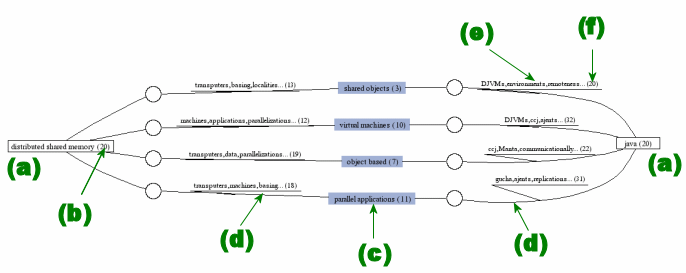Go to Tutorial Page: 1 2 3 4 Next>>
Stepping Stones and Pathways
What is this tool for?
The purpose of this tool is to help you find indirect relationships
between two topics. Indirect means that the relationship between the
two topics will be established by something in common between the
topics, a third concept. For example, if one topic is "distributed
shared
memory" and the other topic is "java", then we can find that java and distributed operating systems
are
related by a particular implementation of distributed shared memory in
Java (let's call it SharedJava), that supports shared objects. Then,
the relationship would be java->SharedJava<-Distributed Shared Memory.
In this tool the relationships are shown as a network, where the
leftmost and rightmost nodes are the topics you want to connect, and
the nodes and lines in between are possible connections between those
topics. For
example, this is the initial graph you would see for "distributed shared
memory" and "java":
The leftmost and rightmost nodes (a) are the
topics you want to connect, and that you have given to the tool. The
number next to the topic title (b) indicates
how many documents we found about that topic. Topics are connected by
other intermediate topics (c), that are
related to them, and the lines in between (d) indicate
which topics are related. The words over the lines connecting the
topics (e)
summarize the terms
in common between the nodes at each end of the line. Only the first 3
terms in common are shown, but the total number of terms in common
between two topics (f) is shown
in parenthesis right after the first 3 terms.
In the picture above, we have a network connecting the topics "distributed shared
memory" and "java",
shown at the left and right. The topics "shared objects", "virtual machines", "object based", and "parallel applications", are each
related to "distributed shared
memory" and "java" .
Each path, like for example "distributed
shared
memory" -> "shared objects"
-> "java"
represents an indirect connection between "distributed shared
memory" and "java".
This path in particular means that "distributed
shared
memory" and "java" are
related to "shared objects".
The words over the line connecting "distributed
shared
memory" and "shared objects",
and between "shared objects"
and "java" are terms in common
between
the topics at each end of the connection.
Next: How the
tool works
Go to Tutorial Page: 1 2 3 4 Next>>
